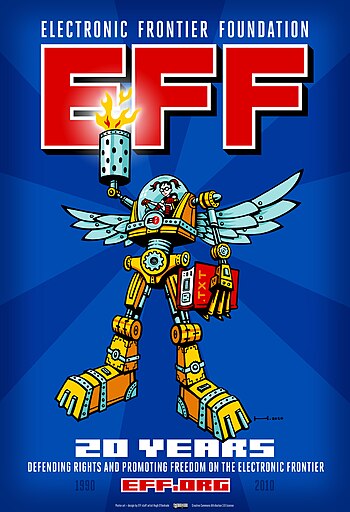| Hugh D'Andrade's design to commemorate Electronic Frontier Foundation's 20th Birthday. (Photo credit: Wikipedia) |
SAN FRANCISCO – They look like normal pills, oblong and a little smaller than a daily vitamin. And as society struggles with the privacy implications of Google Glass, they may represent the next, even more intrusive wave of computing: ingestible computers and sensors stuffed inside pills.
Some people are already swallowing them to monitor a range of health data and wirelessly share it with a doctor.
Inside the pills are tiny sensors and transmitters. Swallowed, the devices make their way to the stomach and stay intact as they travel through the intestinal tract.
“You will – voluntarily, I might add – take a pill, which you think of as a pill but is in fact a microscopic robot, which will monitor your systems,” Eric E. Schmidt, the executive chairman of Google, said last fall. “If it makes the difference between health and death, you’re going to want this thing.”
One pill, made by Proteus Digital Health, uses the body as its power source. Just as a potato can power a light bulb, Proteus has added magnesium and copper on each side of its tiny sensor, which generates just enough electricity from stomach acids. As a Proteus pill hits the bottom of the stomach, it sends information to a cellphone app through a patch worn on the body. It can track medication-taking behaviors and monitor how a patient’s body responds to medicine.
Executives at the company, which recently raised $62.5 million from investors, say they believe that the pills will help patients with physical and neurological problems. People with heart failure-related difficulties could monitor blood flow; those with central nervous system issues, including schizophrenia and Alzheimer’s disease, could take the pills to monitor vital signs. The United States Food and Drug Administration approved the Proteus pill last year.
A pill made by HQ Inc. has a built-in battery and wirelessly transmits body temperature. Lee Carbonelli, HQ’s marketing director, said the company hoped to soon have a consumer version with a smartphone app.
Future generations of pills could be used for convenience.
At a conference in May, Regina Dugan of Motorola Mobility showed an example, along with wearable radio frequency identification tattoos that attach to the skin like a sticker.
Once that pill is in your body, “your entire body becomes your authentication token,” Ms. Dugan said. Sit in the car and it will start. Touch the handle to your home door and it will unlock.
But ingestible computing’s privacy implications are daunting.
“This is yet another one of these technologies where there are wonderful options and terrible options, simultaneously,” said John Perry Barlow of the Electronic Frontier Foundation, a privacy advocacy group. “The wonderful is that there are a great number of things you want to know about yourself on a continual basis, especially if you’re diabetic or suffer from another disease. The terrible is that health insurance companies could know about the inner workings of your body.”
There is one last question for this little pill. After it has done its job, what happens next?
“It passes naturally through the body in about 24 hours,” Ms.Carbonelli said, but since each pill costs $46, “some people choose to recover and recycle it.”
Taken from TODAY Saturday Edition, July 6, 2013
----------
Natural brain cell regeneration?
----------




































